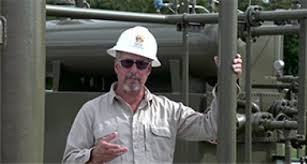Today, the Justice Department, the Environmental Protection Agency (EPA) and the Pennsylvania Department of Environmental Protection (PADEP) announced a proposed settlement with PennEnergy Resources LLC (PennEnergy) resolving alleged Clean Air Act and Pennsylvania Air Pollution Control Act violations involving the company’s oil and gas production operations in Pennsylvania.
If accepted by the court, the consent decree specifies that PennEnergy will undertake various projects to assess, modify and improve the monitoring and maintenance of vapour control systems.
These projects will reduce over 8,200 tons of carbon dioxide equivalent emissions released as methane per year, similar to the reductions achieved by taking 1,740 cars off the road for one year. The settlement will also eliminate more than 150 tons of volatile organic compound (VOC) emissions annually.
PennEnergy also agreed to pay a $2 million civil penalty. This amount will be shared equally by the United States and the Commonwealth of Pennsylvania, a co-plaintiff in this case. PennEnergy will undertake compliance measures to achieve major reductions in harmful emissions at 17 of its oil and gas production facilities and partial measures at an additional 32 facilities in Butler County and Lawrence County, Pennsylvania.
“Oil and gas producers must comply with the Clean Air Act, which is intended to control air emissions and improve air quality and our environment,” said Assistant Attorney General Todd Kim of the Justice Department’s Environment and Natural Resources Division. “By adhering to the requirements of today’s settlement, PennEnergy will significantly reduce air emissions from its operations.”
“Today’s settlement continues EPA’s efforts to hold oil and gas companies accountable for illegal emissions that hamper air quality and accelerate climate change,” said Assistant Administrator David M. Uhlmann of EPA’s Office of Enforcement and Compliance Assurance. “Penn Energy will undertake projects to improve air quality and reduce emissions of methane at nearly 50 facilities, providing environmental and public health benefits for Pennsylvanians and demonstrating that reducing illegal pollution from oil and gas facilities is good for communities and the planet.”
“When PennEnergy failed to implement an appropriate vapour control system on storage tanks at its facilities in western Pennsylvania, the company not only violated federal law, it allowed a substantial volume of volatile organic compounds to escape into the atmosphere,” said U.S. Attorney Eric G. Olshan for the Western District of Pennsylvania.
“This settlement marks a significant step toward reducing emissions and ensuring cleaner air for all residents of the Commonwealth,” said Acting Pennsylvania Department of Environmental Protection Secretary Jessica Shirley. “Every Pennsylvanian is entitled to breathe clean air, and the Shapiro Administration is dedicated to ensuring that polluters are held responsible for any harm to that right.”
This settlement resolves PennEnergy’s failure to comply with federal and state requirements to capture and control air emissions from five oil and gas production facilities in Butler County, western Pennsylvania. EPA identified the alleged violations through field investigations conducted in 2018.
As a result of these violations, PennEnergy released methane and VOCs directly into the air instead of capturing and controlling the gas using specially designed equipment. Methane, a climate super-pollutant, is a potent greenhouse gas contributing to climate change, and VOCs contribute to ground-level ozone, adversely affecting human health.
The agreement requires PennEnergy to take the necessary steps to ensure that its systems to control pollutants from atmospheric storage tanks are adequately designed, properly operated, and maintained at an estimated cost of $2.4 million. These actions will significantly reduce harmful emissions from the company’s oil and gas operations.
In addition, PennEnergy must undertake a project to mitigate the environmental and public health harm attributable to their violations. Specifically, by January 1, 2025, PennEnergy will be required to replace no fewer than 217 pollutant-emitting pneumatic devices with non-emitting devices in Butler and Lawrence counties in western Pennsylvania. These measures are estimated to cost $1.2 million.
PennEnergy is a privately owned oil and gas company headquartered in Cranberry Township, Pennsylvania. Its business is focused on acquiring and developing unconventional shale resources in the Appalachian Basin, and its natural gas extraction and production operations consist of approximately 370 wells at 107 oil and gas facilities in western Pennsylvania.




